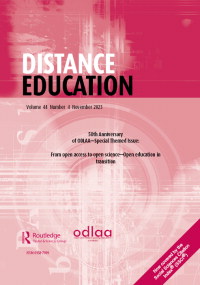先前的在线反馈经验:对学生参与的影响
IF 3
1区 教育学
Q1 EDUCATION & EDUCATIONAL RESEARCH
引用次数: 3
摘要
虽然关于反馈过程的文献已经确定了两种反馈方法——更多的传播或更多的对话——但很少有经验证据表明学生如何看待反馈实践,特别是在在线教育中。此外,缺乏关于以往在线反馈经验(频率、时间、反馈类型和重新提交作业的机会)以及这如何影响学生参与度的研究。为了提供有关这些问题的证据,我们对1766名本科学生进行了在线问卷调查。结果表明,学生倾向于认为反馈实践类似于传递模型。即便如此,研究结果证实,学生之前对在线反馈的体验会影响他们对在线反馈的认知参与程度。本文讨论的重点是在在线教育中开展对话反馈实践的重要性,并论证了在教学和机构层面上有目的地设计反馈的重要性。本文章由计算机程序翻译,如有差异,请以英文原文为准。
Prior experience with online feedback: its influence on students’ engagement
Abstract Although the literature on feedback processes has identified two approaches to feedback—more transmissive or more dialogical—there is little empirical evidence of how students perceive feedback practices, particularly in online education. Moreover, there is a lack of research addressing previous experience with online feedback (frequency, timing, type of feedback and the opportunity to resubmit their work) and how this influences student engagement. To provide evidence regarding these issues, we administered an online questionnaire to 1,766 bachelor students. Results suggested that students tend to perceive feedback practices as resembling the transmissive model. Even so, the results confirmed that students’ prior experience with online feedback influences their degree of cognitive engagement with it. The discussion in this paper focuses on the importance of carrying out dialogical feedback practices in online education, as well as demonstrating why it is important to purposefully design feedback, at both instructional and institutional levels.
求助全文
通过发布文献求助,成功后即可免费获取论文全文。
去求助
来源期刊

Distance Education
EDUCATION & EDUCATIONAL RESEARCH-
CiteScore
10.70
自引率
6.80%
发文量
29
期刊介绍:
Distance Education, a peer-reviewed journal affiliated with the Open and Distance Learning Association of Australia, Inc., is dedicated to publishing research and scholarly content in the realm of open, distance, and flexible education. Focusing on the freedom of learners from constraints in time, pace, and place of study, the journal has been a pioneering source in these educational domains. It continues to contribute original and scholarly work, playing a crucial role in advancing knowledge and practice in open and distance learning.
 求助内容:
求助内容: 应助结果提醒方式:
应助结果提醒方式:


